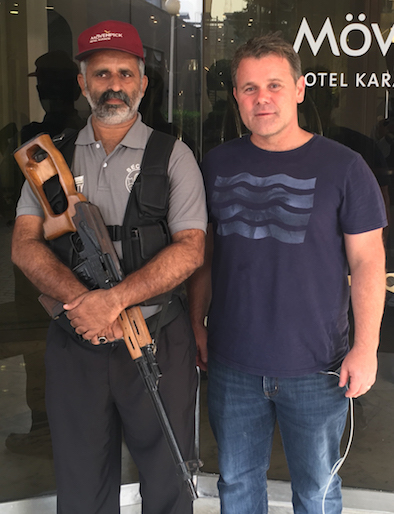An unprecedented leak of thousands of files from the US government’s most confidential financial intelligence database has shone a spotlight on the world’s $2 trillion-a-year dirty money habit. As Nathan Lynch reveals, this story goes much deeper than the glib “bad bankers” narrative being trotted out by the world’s media.
In many countries, filing a Suspicious Activity Report (SAR) can be a death sentence. Money is the lifeblood that courses through the criminal economy’s veins. Whether it’s the meth trade, human trafficking, terrorism, child exploitation or wildlife crime, the world’s most ruthless criminals will kill to get their hands on more tainted lucre. And once they have obtained it, they will kill to keep it.
I met with a banker in Pakistan last year who has two armed guards to protect his family. Wherever he goes, he’s shadowed by an armed escort, paid for by his employer. In Pakistan, this is just a cost of doing business and keeping staff safe.
His mistake? Following the law and reporting on suspected terrorist financing to the country’s anti-money laundering (AML) unit.
I’ve shared a beer with an ex-Drug Enforcement Agency special agent who had to pry the body of a financier from the back of a car in Mexico City. The financier was one of his main informants on a global drug cartel money-laundering operation. Photographic evidence was grisly, showing the man’s hands tethered behind his back with his necktie. His fingertips were burnt to black stumps.
In bustling Amman, the capital of Jordan, I’ve broken warm bread with an inspirational AML officer. He loves his work — his professional calling — despite operating in one of the region’s most high-risk markets. He occasionally gets tailgated on the way home from work, after filing SARs on suspected terrorism financing. It comes with the territory in one of the world’s geopolitical hotspots.
“They want us to know that they’re watching, that there can be consequences for this type of work,” he said, shrugging his shoulders in the way that’s typical of people living under a permanent cloud of existential risk.
These are just some of the stories of the world’s AML community; the people who love the challenge and sense of purpose that comes with using financial flows to identify serious criminal activity. Their job is to understand their business, their geographical risks, their customers and to spot anomalies that might indicate criminal activity. They need to master a range of talents, from interpersonal skills and “human intelligence” through to cutting-edge IT platforms and the use of big data.
Their job is not to prove crimes. It is to act as the bank’s conscience; its eyes and ears and its voice of professional scepticism. At the point when they’ve formed a suspicion, these mild-mannered heroes package up a file, and feed it securely to their local financial intelligence unit (FIU).
They may decide to close the bank account if it’s deemed very high risk but, more often than not, those decisions are made by the relationship manager.
At a technical level, the businesses that do this difficult work are termed “reporting entities”. It’s their job to run a legitimate business, to manage their risks, and to report any anomalies to agencies like FinCEN and AUSTRAC, Australia’s highly regarded financial crime intelligence agency.
“It’s a risk-based regime. It’s not a risk elimination game,” the ex-DEA agent tells me. “The bank’s job is to run a business and to report anything that’s suspicious. Law enforcement’s job is to work with that intelligence, to build the bigger picture. The only way a bank can eliminate money laundering entirely is to close its doors.”
Sixteen months in a leaky boat
This week the financial intelligence world was shaken to its core when the International Consortium of Investigative Journalists (ICIJ) confirmed it had been fed more than 2,100 of these highly sensitive reports. Thomson Reuters Regulatory Intelligence broke the news several weeks ago, tipping off the financial crime community that their SARs were in the hands of some of the world’s most prestigious investigative journalists.
On Monday the ICIJ partners released the first series of articles based on SARs that detailed suspicious transactions involving more than US$2 trillion. The reports were filed by some of the largest global banks, including HSBC, JPMorgan, Deutsche Bank, Standard Chartered and Bank of New York Mellon.
The source of the leaks is uncertain, though some financial intelligence experts believe the material may be part of an earlier breach involving a FinCEN insider. Bank insiders have now decided the material came directly from FinCEN’s database.
There was a palpable chill across the sector, as bank staff worried that their names and contact details may be “out there in the wild” on confidential SAR forms. Banks are required to provide a point of contact when they file SARs. These days FinCEN lets them list a generic bank contact centre, for personal security reasons. But in the past these SARs often listed the individual who formed the suspicion within the bank.
Trust and confidentiality
Financial crime experts with international experience, on the public and private sector sides, said the leaks would damage the trust and confidentiality that underlies the AML regime. On the other hand, the media reports may trigger a re-think about the effectiveness of the existing financial crime compliance framework, which is led by the Financial Action Task Force (FATF).
“The FinCEN files highlight the reality that the AML/CTF current system is fundamentally flawed and is often deeply ineffective, despite the substantial cost and effort put into it by both reporting entities and regulators,” said Neil Jeans, principal consultant at Initialism.
Jeans has worked on global financial crime cases with UK police in the 1990s, before joining the UK regulator to help set up the country’s AML/CFT regime in 1998. He has since worked in leading international banks and consulting firms as an AML/CTF expert.
“Reporting entities and regulators both bear the responsibility for poor outcomes Reporting entities should revise their approach to ensure effective financial crime risk management is part of their DNA. Regulators need to evolve their expectations beyond box ticking.”
Suspicious minds
AML practitioners have said the existence of these SARs is proof that the banks involved had reported their suspicions to the relevant agencies. It is then up to the criminal intelligence and law enforcement community to take further action.
Bill Majcher, a former undercover agent with Canadian and US law enforcement, said there were plenty of legitimate reasons to continue doing business with criminals. Authorities often ask banks to leave accounts open so they can gather more evidence for an ongoing investigation. It takes time to build a criminal brief.
Majcher also noted that “covert operatives” will often set up bank accounts to wash money for criminal groups as part of their “proactive” investigative work. This is what he did in his former life as a covert operative, pretending to represent a major Colombian drug cartel.
Vow of secrecy
Under federal law, the banks are prevented from even acknowledging the existence of a SAR. Once a bank files a report with the relevant FIU it is not obligated to close the account and will often await further guidance from law enforcement on how to handle the accounts.
Gavin Coles, a financial crime expert with Kasker Consulting and a former bank AML officer, said the latest leaks highlighted the volume of information that banks feed to FIUs on suspected money laundering. He said the estimated $2 trillion laundered each year poses an insurmountable challenge to law enforcement agencies, which face numerous budgetary and jurisdictional challenges.
“The analysis of information [in the FinCEN Files] is impressive. It shows the volume of transactions of concern moving around the world globally. One could look at it in a positive light in that all of these transactions were shared with the authorities, which would not have happened 30 years ago,” Coles said.
“In many cases the banks would have assisted with investigations. The next logical question is whether the authorities in the US or elsewhere have been able to act on information provided to prosecute, where appropriate, and to recover funds. This is a critical part of any AML regime.”
However, a SAR is only evidence of a suspicion and the funds involved in any reported transactions may be legitimate. Individual banks can’t see the full picture that law enforcement agencies can build by combining information from other banks and criminal intelligence data.
FIUs in the spotlight
Richard Carrick, the chief executive of Crime Stoppers Asia, said the release of FinCEN’s most sensitive data holdings would lead other FIUs to consider their vulnerability to a breach. Carrick, who has 20 years’ experience in financial crime compliance, said this could also have a chilling effect on the trust that powers public-private “fintel” partnerships.
Carrick said the focus was likely to shift from banks to the FIUs and their partner agencies, which failed to detect and disrupt these money laundering and terrorist financing schemes, despite solid evidence from the banking community.
Thankfully the members of the latest ICIJ global exposé are being diligent in minimising the risk that individual SAR filers will be identified.
For the banks, however, it’s a devastating blow. Reporting on your customers is never a good look in business. Especially when “reporting entities” are obligated to report mere suspicions — a test that falls well short of any hard evidence of a crime.
The most positive outcome would be for the public to gain an insight into the extent to which kleptocrats, drug kingpins, human traffickers and multinational tax evaders have infiltrated the global economy. Rampant financial crime and corruption has already undermined the world’s liberal democracies. If people don’t demand change, the privileges of living in a civil society, which many Australians take for granted, may also be at risk. Civil societies are always built upon a fair and orderly financial system.
I was in a major financial centre recently with some Venezuelan dissidents, who are using cutting-edge intelligence to track the suspected US$1 trillion stolen from their massive oil revenues.
Their love for their country, and their eloquence in describing the Venezuelan people’s plight, still haunts me.
“In the 1950s, Venezuela used to be the fourth richest country in the world, in GDP per capita. Today, it’s a failed state,” an economist told me, his dark eyes burning.
“I know exactly what the sting of tear gas feels like as it burns your nostrils. We’ve felt the police batons on our backs. Venezuela has a warning for countries like yours: It only takes 20 years to destroy a democracy.”
Editor’s Note: the ICIJ, as it has done with the Panama Papers and Panama Papers leaks, kept the vast bulk of the data secret. The banks, who have reported as required, have been identified but not the perpetrators about whom they are reporting. In Australia, only the identity of a Gold Coast jetski dealer has been revealed.
Westpac’s pursuit of profit “placed children directly at risk of harm”
Nathan Lynch is a writer and international speaker who has spent two decades investigating the hidden world of dark money that fuels organised crime, corruption and violent extremism around the globe. He is certified by the US Department of Justice's elite CCIPS Cybercrime Laboratory and is a program expert with the Financial Services Volunteer Corps, which provides support to developing countries to help them combat the scourges of money laundering and other serious financial crimes. Nathan has trained police, government officials and bankers across Asia and the Middle East on the techniques the world's criminals use to conceal and clean their dirty money.


